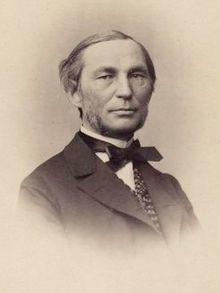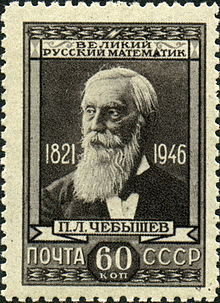Pafnuti Chebyshov
Pafnuti Lvovich Chebyshov (Russian: Пафнутий Львович Чебышёв [pɐfˈnutʲɪj ˈlʲvovʲɪɪbɕ t]) (May 16, 1821 – December 8, 1894) was a Russian mathematician, also known as "Chebyshev" or by other similar spellings of his last name, his main contribution to human knowledge is the inequality that bears his name.
Biography
Early Years
One of five siblings, he was born in the village of Okatovo, in the Borovsk district, Kaluga province. His father was the wealthy landowner Lev Pavlovich Chebyshov. Pafnuti received primary education from him at his home, from his mother Agrafena Ivanovna Chebyshova (reading and writing) and from his cousin Avdotya Kvintilyanovna Sukharyova (French and arithmetic). His music teacher also played an important role in Chebyshov's upbringing, as she "brought his mind to accuracy and analysis," Chebyshov himself mentioned.
It is possible that during his adolescence and development a physical handicap was significant, the reasons for which are unknown: he had limped since childhood and walked with the aid of a cane. Therefore his parents gave up the idea of making him a career as an officer, even though he had followed the family tradition. His handicap kept him away from most childish games, so he soon devoted himself to a passion that would determine the rest of his life: the construction of mechanisms.
In 1832 the family moved to Moscow mainly for the education of their eldest sons (Pafnuti and Pavel, who would become lawyers). Education continued at home, being hired as a teacher of mathematics and physics P.N. Pogorelski, considered one of the best teachers in Moscow, and who had educated, among others, the writer Ivan Turgenev. For the other subjects, teachers of excellent reputation were also invited.
University studies
Chebyshov passed the entrance exams in the summer of 1837 and in September began his studies in mathematics at the second philosophical department of Moscow University. His teachers included Nikolai Brashman, N.E. Zernov and Dmitri Perevoshchikov. There is no doubt that, among them, Brashman had the greatest influence on Chebyshov. He instructed her in practical mechanics and probably showed her the work of the French engineer Jean-Victor Poncelet. In 1841 he was awarded the silver medal for his work & # 34; calculation of the roots of equations & # 34; which he had finished in 1838. In this contribution Chebyshov derived an algorithmic approximation for the solution of algebraic equations of n -th degree based on Newton's algorithm. In that same year he finished his studies as the "most outstanding candidate".
In 1841 the economic situation of Chebyshov changed drastically. A famine broke out in Russia, his parents were forced to leave town and unable to support their children. In any case, he decided to continue his mathematical studies and prepared for the master's exams that were spread over half a year. He passed the final examination in October 1843. In 1846 he defended his thesis "An Attempt at Elementary Analysis of Probabilistic Theory" . The biographer Prudnikov assumes that Chebyshov was directed to this branch of mathematics after learning about the recent publication of books on probabilistic theory or because of the growth of the insurance industry in Russia.
Adult Years
In 1847 Chebyshov defended his dissertation provenia legendi "On integration with the help of algorithms" before the University of Saint Petersburg and thus obtained the right to teach there. At that time, Viktor Buniakovski edited some works by Leonhard Euler rediscovered by P. N. Fuss, which encouraged Chebyshov to devote himself to studying them. In this way he found the basis of the topics of interest to him. As early as 1848 he had submitted his work on the theory of congruences for his doctorate, which he defended in May 1849. After a year he was elected extraordinary professor at the University of Saint Petersburg, to become ordinary professor in 1860. In 1872, after 25 years of teaching, he became a meritorious professor. In 1882 he left the university and fully devoted his life to research.
Apart from his university lectures, from 1852 to 1858 Chebyshov taught practical mechanics at the Imperial Lyceum in Tsarskoye Selo (now Pushkin), a southern suburb of Saint Petersburg.
His scientific achievements account for his election as a junior (adjunct) scholar in 1856. He later became an extraordinary member of the Imperial Academy of Sciences (1856) and an ordinary member in 1858. Moreover, he assumed other honorable positions and was decorated several times: in 1856 he became a member of the scientific committee of the national ministry of education, which was followed in 1859 by ordinary membership in the ordinance department of the academy with the adoption of the headship. of the commission for mathematical questions according to the ordinance and experiments related to shooting theory. The Paris Academy selected him as a correspondent member in 1860 and as a full member in 1874. In 1893 he was elected an honorary member of the St. Petersburg Mathematical Society, recently founded in 1890.
Pafnuti Lvovich Chebyshov died on November 26, 1894 in St. Petersburg
Mathematical contributions
It is known for its work in the area of probability and statistics. Chebyshov's inequality says that the probability of a random variable being distanced from its average in more than a times the typical deviation is less or equal than 1/a2. Yeah. is the mean (or mathematical hope) and σ is the typical deviation, then we can redefine the relationship as:
for all positive real numbers a. The inequality of Chebyshov is used to demonstrate the weak law of the large numbers and the theorem of Bertrand-Chebyshov (1845cult1850) which states that the number of minor prime numbers than the number of n That's it. .
Legacy
His students included Dmitry Grave, Aleksandr Korkin, Aleksandr Lyapunov, and Andrei Markov.
Acknowledgments
- The lunar crater Chebyshev (according to his English graph) carries this name in his honor.
Contenido relacionado
Gaspard Monge
Benoit Mandelbrot
Mary D'Empire
Andrei Kolmogorov
Olga Ladyzhenskaya




